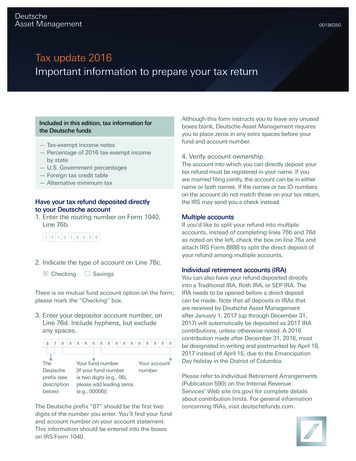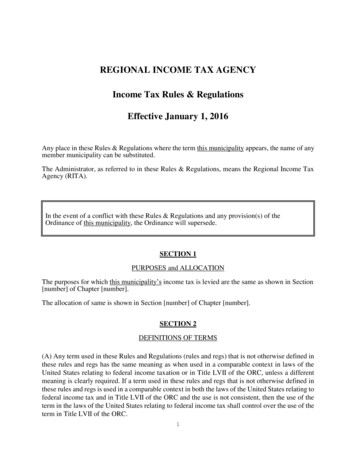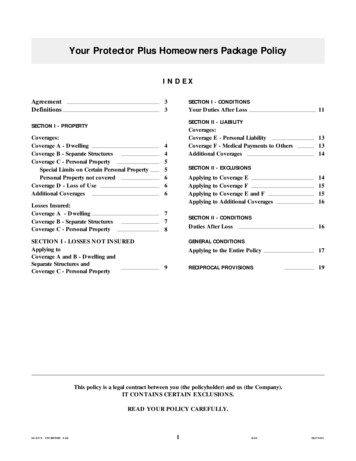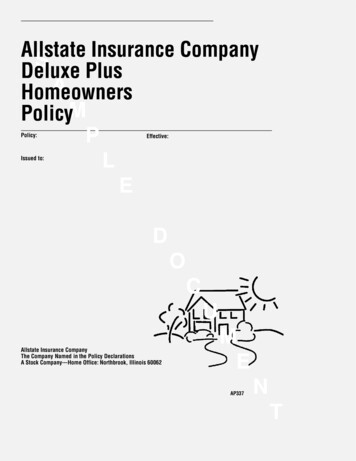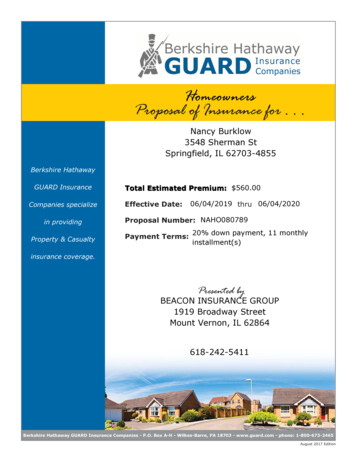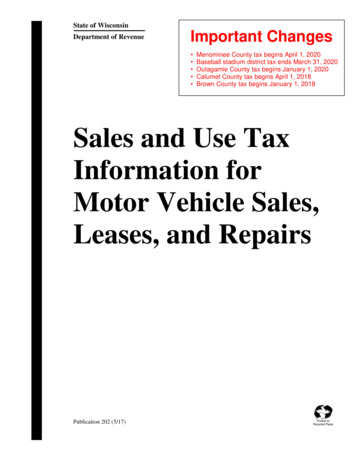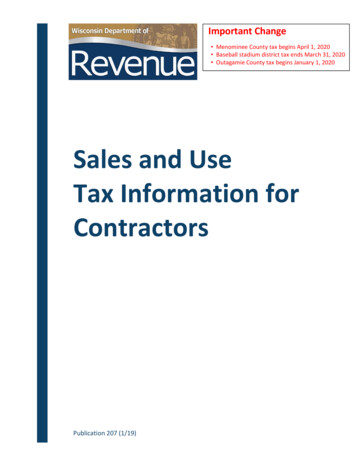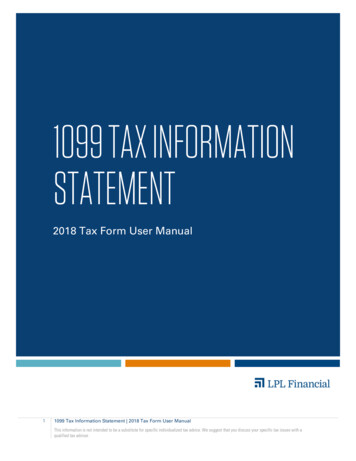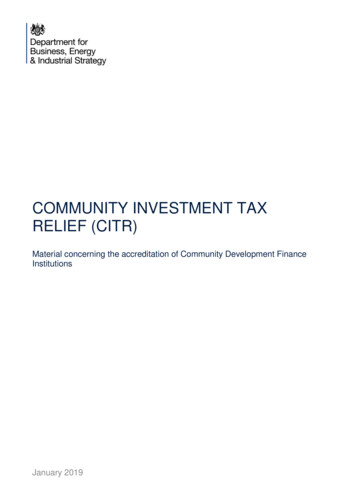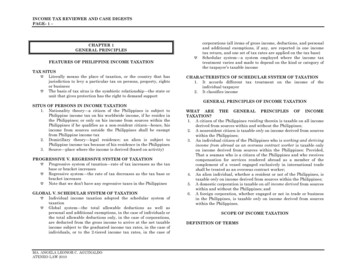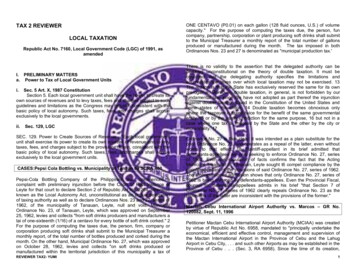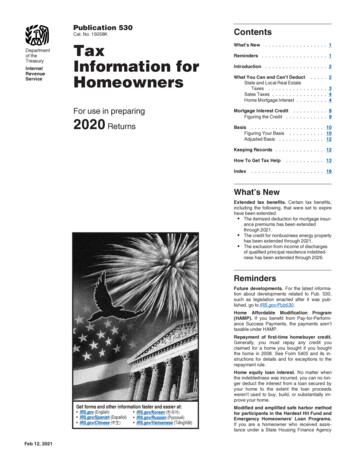
Transcription
Publication 530ContentsTaxInformation forHomeownersWhat’s NewCat. No. 15058KDepartmentof theTreasuryInternalRevenueServiceFor use in preparing2020 Returns. 1Reminders . . . . . . . . . . . . . . . . . . . 1Introduction . . . . . . . . . . . . . . . . . . 2What You Can and Can’t Deduct . .State and Local Real EstateTaxes . . . . . . . . . . . . . .Sales Taxes . . . . . . . . . . . . .Home Mortgage Interest . . . . . . 2. 3. 4. 4Mortgage Interest Credit . . . . . . . . . . 8Figuring the Credit . . . . . . . . . . . . 9Basis . . . . . . . . . . . . . . . . . . . . . 10Figuring Your Basis . . . . . . . . . . 10Adjusted Basis . . . . . . . . . . . . . 12Keeping Records . . . . . . . . . . . . . . 12How To Get Tax HelpIndex. . . . . . . . . . . 13. . . . . . . . . . . . . . . . . . . . . 16What’s NewExtended tax benefits. Certain tax benefits,including the following, that were set to expirehave been extended. The itemized deduction for mortgage insurance premiums has been extendedthrough 2021. The credit for nonbusiness energy propertyhas been extended through 2021. The exclusion from income of dischargesof qualified principal residence indebtedness has been extended through 2026.RemindersFuture developments. For the latest information about developments related to Pub. 530,such as legislation enacted after it was published, go to IRS.gov/Pub530.Home Affordable Modification Program(HAMP). If you benefit from Pay-for-Performance Success Payments, the payments aren’ttaxable under HAMP.Repayment of first-time homebuyer credit.Generally, you must repay any credit youclaimed for a home you bought if you boughtthe home in 2008. See Form 5405 and its instructions for details and for exceptions to therepayment rule.Get forms and other information faster and easier at: IRS.gov (English) IRS.gov/Spanish (Español) IRS.gov/Chinese (中文)Feb 12, 2021 IRS.gov/Korean (한국어) IRS.gov/Russian (Pусский) IRS.gov/Vietnamese (TiếngViệt)Home equity loan interest. No matter whenthe indebtedness was incurred, you can no longer deduct the interest from a loan secured byyour home to the extent the loan proceedsweren't used to buy, build, or substantially improve your home.Modified and amplified safe harbor methodfor participants in the Hardest Hit Fund andEmergency Homeowners' Loan Programs.If you are a homeowner who received assistance under a State Housing Finance Agency
Hardest Hit Fund program or an EmergencyHomeowners' Loan Program, you may be ableto deduct all of the payments you made on yourmortgage during the year. Notice 2018-63 extends and preserves application of the HardestHit Fund safe harbor to homeowners who maybe affected by the new limitation on the deduction for state and local taxes. For details, seeHardest Hit Fund and Emergency Homeowners'Loan Programs under What You Can and Can'tDeduct, later, and Notice 2018-63 for additionalguidance. Notice 2018-63 is available atIRS.gov/IRB/2018-34 IRB#NOT-2018-63.Discharge of qualified principal residenceindebtedness before 2027. Qualified principal residence indebtedness can be excludedfrom income for discharges before January 1,2027.Residential energy credits. You may be ableto take a credit if you made energy saving improvements to your home located in the UnitedStates in 2020. See Form 5695, Residential Energy Credits, for more information.You can send us comments throughIRS.gov/FormComments. Or, you can write tothe Internal Revenue Service, Tax Forms andPublications, 1111 Constitution Ave. NW,IR-6526, Washington, DC 20224.Although we can’t respond individually toeach comment received, we do appreciate yourfeedback and will consider your comments andsuggestions as we revise our tax forms, instructions, and publications. Do not send tax questions, tax returns, or payments to the above address.Getting answers to your tax questions.If you have a tax question not answered by thispublication or the How To Get Tax Help sectionat the end of this publication, go to the IRS Interactive Tax Assistant page at IRS.gov/Help/ITA where you can find topics by using thesearch feature or viewing the categories listed.Getting tax forms, instructions, and publications. Visit IRS.gov/Forms to downloadcurrent and prior-year forms, instructions, andpublications.Mortgage debt forgiveness. You can exclude from gross income any discharges ofqualified principal residence indebtednessmade after 2006 and in most cases before2026. You must reduce the basis of your principal residence (but not below zero) by theamount you exclude. See Discharges of qualified principal residence indebtedness, later,and Form 982, Reduction of Tax Attributes Dueto Discharge of Indebtedness (and Section1082 Basis Adjustment), for more information.Ordering tax forms, instructions, andpublications. Go to IRS.gov/OrderForms toorder current forms, instructions, and publications; call 800-829-3676 to order prior-yearforms and instructions. The IRS will processyour order for forms and publications as soonas possible. Do not resubmit requests you’vealready sent us. You can get forms and publications faster online.Photographs of missing children. The IRS isa proud partner with the National Center forMissing & Exploited Children (NCMEC). Photographs of missing children selected by theCenter may appear in this publication on pagesthat would otherwise be blank. You can helpbring these children home by looking at thephotographs and calling 1-800-THE-LOST(1-800-843-5678) if you recognize a child.You may want to see:Useful ItemsPublication4681 Canceled Debts, Foreclosures,Repossessions, and Abandonments4681523 Selling Your Home523525 Taxable and Nontaxable Income525IntroductionThis publication provides tax information forhomeowners. Your home may be a house, condominium, cooperative apartment, mobilehome, houseboat, or house trailer that containssleeping space and toilet and cooking facilities.This publication explains how you treatitems such as settlement and closing costs, realestate taxes, sales taxes, home mortgage interest, and repairs.The following topics are explained. What you can and can’t deduct on your taxreturn. The tax credit you can claim if you received a mortgage credit certificate whenyou bought your home. Why you should keep track of adjustmentsto the basis of your home. (Your home'sbasis generally is what it cost; adjustmentsinclude the cost of any improvements youmight make.) What records you should keep as proof ofthe basis and adjusted basis.Comments and suggestions. We welcomeyour comments about this publication and suggestions for future editions.Page 2527 Residential Rental Property527547 Casualties, Disasters, and Thefts547551 Basis of Assets551555 Community Property555587 Business Use of Your Home587936 Home Mortgage Interest Deduction936Form (and Instructions)Schedule A (Form 1040) ItemizedDeductionsSchedule A (Form 1040)5405 Repayment of the First-TimeHomebuyer Credit54055695 Residential Energy Credits56958396 Mortgage Interest CreditWhat You Can and Can’tDeductTo deduct expenses of owning a home, youmust file Form 1040, U.S. Individual IncomeTax Return, or Form 1040-SR, U.S. Income TaxReturn for Seniors, and itemize your deductionson Schedule A (Form 1040). If you itemize, youcan’t take the standard deduction.This section explains what expenses youcan deduct as a homeowner. It also points outexpenses that you can’t deduct. There are fourprimary discussions: state and local real estatetaxes, sales taxes, home mortgage interest,and mortgage insurance premiums.Generally, your real estate taxes and homemortgage interest are included in your housepayment.Your house payment. If you took out a mortgage (loan) to finance the purchase of yourhome, you probably have to make monthlyhouse payments. Your house payment may include several costs of owning a home. The onlycosts you can deduct are state and local realestate taxes actually paid to the taxing authorityand interest that qualifies as home mortgage interest, and mortgage insurance premiums.These are discussed in more detail later.Some nondeductible expenses that may beincluded in your house payment include: Fire or homeowner's insurance premiums,and The amount applied to reduce the principalof the mortgage.Minister's or military housing allowance. Ifyou are a minister or a member of the uniformed services and receive a housing allowance that isn’t taxable, you still can deduct yourreal estate taxes and your home mortgage interest. You don’t have to reduce your deductions by your nontaxable allowance. For moreinformation, see Pub. 517, Social Security andOther Information for Members of the Clergyand Religious Workers, and Pub. 3, ArmedForces' Tax Guide.Nondeductible payments. You can’t deductany of the following items. Insurance (other than mortgage insurancepremiums), including fire and comprehensive coverage, and title insurance. Wages you pay for domestic help. Depreciation. The cost of utilities, such as gas, electricity, or water. Most settlement costs. See Settlement orclosing costs under Cost as Basis, later,for more information. Forfeited deposits, down payments, or earnest money.8396982 Reduction of Tax Attributes Due toDischarge of Indebtedness (andSection 1082 Basis Adjustment)982See How To Get Tax Help, near the end of thispublication, for information about getting publications and forms.Hardest Hit Fund andEmergency Homeowners'Loan ProgramsYou can use a special method to figure your deduction for mortgage interest and real estatePublication 530 (2020)
taxes on your main home if you meet the following two conditions.1. You received assistance under:a. A State Housing Finance Agency(State HFA) Hardest Hit Fund program in which program paymentscould be used to pay mortgage interest, orb. An Emergency Homeowners' LoanProgram (EHLP) administered by theDepartment of Housing and UrbanDevelopment (HUD) or a state.2. You meet the rules to deduct all of themortgage interest on your loan and all ofthe real estate taxes on your main home.If you meet these conditions, then you candeduct all of the payments you actually madeduring the year to your mortgage servicer, theState HFA, or HUD on the home mortgage (including the amount shown in box 3 of Form1098-MA, Mortgage Assistance Payments), butnot more than the sum of the amounts shown inbox 1 (mortgage interest received), box 5 (mortgage insurance premiums), and box 10 (realproperty taxes) of Form 1098, Mortgage Interest Statement.You may first allocate amounts paid to mortgage interest up to the amount shown on Form1098. You may then use any reasonablemethod to allocate the remaining balance of thepayments to real property taxes. Regardless ofhow you determine the deductible amount under this special safe harbor method, anyamount allocated to state or local propertytaxes is subject to the limitation on the deduction for state and local taxes. However, youaren’t required to use this special method to figure your deduction for mortgage interest andreal estate taxes on your main home.For additional guidance,2018-63,availableat2018-34 IRB#NOT-2018-63.see NoticeIRS.gov/irb/State and Local Real EstateTaxesMost state and local governments charge anannual tax on the value of real property. This iscalled a real estate tax. You can deduct the taxif it is assessed uniformly at a like rate on all realproperty throughout the community. The proceeds must be for general community or governmental purposes and not be a payment for aspecial privilege granted or special service rendered to you.The deduction for state and local taxes,including real estate taxes, is limited toCAUTION 10,000 ( 5,000 if married filing separately). See the Instructions for Schedule A(Form 1040) for more information.!Deductible Real Estate TaxesYou can deduct real estate taxes imposed onyou. You must have paid them either at settlement or closing, or to a taxing authority (eitherdirectly or through an escrow account) duringthe year. If you own a cooperative apartment,see Special Rules for Cooperatives, later.Publication 530 (2020)Where to deduct real estate taxes. Enter theamount of your deductible state and local realestate taxes on Schedule A (Form 1040),line 5b.Real estate taxes paid at settlement or closing. Real estate taxes are generally divided sothat you and the seller each pay taxes for thepart of the property tax year you owned thehome. Your share of these taxes is fully deductible if you itemize your deductions.Division of real estate taxes. For federalincome tax purposes, the seller is treated aspaying the property taxes up to, but not including, the date of sale. You (the buyer) are treatedas paying the taxes beginning with the date ofsale. This applies regardless of the lien datesunder local law. Generally, this information is included on the settlement statement you get atclosing.You and the seller each are considered tohave paid your own share of the taxes, even ifone or the other paid the entire amount. Youeach can deduct your own share, if you itemizedeductions, for the year the property is sold.Example. You bought your home on September 1. The property tax year (the period towhich the tax relates) in your area is the calendar year. The tax for the year was 730 andwas due and paid by the seller on August 15.You owned your new home during the property tax year for 122 days (September 1 to December 31, including your date of purchase).You figure your deduction for real estate taxeson your home as follows.1.2.3.4.Enter the total real estate taxesfor the real property tax year . . . .Enter the number of days in theproperty tax year that you ownedthe property . . . . . . . . . . . . . . . . .Divide line 2 by 366 . . . . . . . . . . .Multiply line 1 by line 3. This isyour deduction. Enter it onSchedule A (Form 1040),line 5b . . . . . . . . . . . . . . . . . . . 7301220.3333 243You can deduct 243 on your return for theyear if you itemize your deductions. You areconsidered to have paid this amount and candeduct it on your return even if, under the contract, you didn’t have to reimburse the seller.Delinquent taxes. Delinquent taxes areunpaid taxes that were imposed on the seller foran earlier tax year. If you agree to pay delinquent taxes when you buy your home, you can’tdeduct them. You treat them as part of the costof your home. See Real estate taxes, later, under Basis.Escrow accounts. Many monthly house payments include an amount placed in escrow (putin the care of a third party) for real estate taxes.You may not be able to deduct the total you payinto the escrow account. You can deduct onlythe real estate taxes that the lender actuallypaid from escrow to the taxing authority. Yourreal estate tax bill will show this amount.Refund or rebate of real estate taxes. If youreceive a refund or rebate of real estate taxesthis year for amounts you paid this year, youmust reduce your real estate tax deduction bythe amount refunded to you. If the refund or rebate was for real estate taxes paid for a prioryear, you may have to include some or all of therefund in your income. For more information,see Recoveries in Pub. 525, Taxable and Nontaxable Income.Items You Can’t Deductas Real Estate TaxesThe following items aren’t deductible as real estate taxes.Charges for services. An itemized charge forservices to specific property or people isn’t atax, even if the charge is paid to the taxing authority. You can’t deduct the charge as a realestate tax if it is: A unit fee for the delivery of a service (suchas a 5 fee charged for every 1,000 gallons of water you use), A periodic charge for a residential service(such as a 20 per month or 240 annualfee charged to each homeowner for trashcollection), or A flat fee charged for a single service provided by your local government (such as a 30 charge for mowing your lawn becauseit had grown higher than permitted under alocal ordinance).You must look at your real estate taxbill to decide if any nondeductible itemCAUTION ized charges, such as those listedabove, are included in the bill. If your taxing authority (or lender) doesn’t furnish you a copy ofyour real estate tax bill, ask for it. Contact thetaxing authority if you need additional information about a specific charge on your real estatetax bill.!Assessments for local benefits. You can’tdeduct amounts you pay for local benefits thattend to increase the value of your property. Local benefits include the construction of streets,sidewalks, or water and sewer systems. Youmust add these amounts to the basis of yourproperty.You can, however, deduct assessments (ortaxes) for local benefits if they are for maintenance, repair, or interest charges related tothose benefits. An example is a charge to repairan existing sidewalk and any interest includedin that charge.If only a part of the assessment is for maintenance, repair, or interest charges, you mustbe able to show the amount of that part to claimthe deduction. If you can’t show what part of theassessment is for maintenance, repair, or interest charges, you can’t deduct any of it.An assessment for a local benefit may belisted as an item in your real estate tax bill. If so,use the rules in this section to find how much ofit, if any, you can deduct.Transfer taxes (or stamp taxes). You can'tdeduct transfer taxes and similar taxes andcharges on the sale of a personal home. If youare the buyer and you pay them, include themin the cost basis of the property. If you are theseller and you pay them, they are expenses ofthe sale and reduce the amount realized on thesale.Page 3
Homeowners’ association assessments.You can't deduct these assessments becausethe homeowners’ association, rather than astate or local government, imposes them.Foreign taxes you paid on real estate. Youcan't deduct foreign taxes you paid on real estate.Special Rules for CooperativesIf you own a cooperative apartment, some special rules apply to you, though you generally receive the same tax treatment as other homeowners. As an owner of a cooperativeapartment, you own shares of stock in a corporation that owns or leases housing facilities.You can deduct your share of the corporation'sdeductible real estate taxes if the cooperativehousing corporation meets the following conditions.1. The corporation has only one class ofstock outstanding.2. Each stockholder, solely because of ownership of the stock, can live in a house,apartment, or house trailer owned orleased by the corporation.3. No stockholder can receive any distribution out of capital, except on a partial orcomplete liquidation of the corporation.4. At least one of the following.a. At least 80% of the corporation'sgross income for the tax year waspaid by the tenant-stockholders. Forthis purpose, gross income means allincome received during the entire taxyear, including any received beforethe corporation changed to cooperative ownership.b. At least 80% of the total square footage of the corporation's property mustbe available for use by the tenant-stockholders during the entire taxyear.c. At least 90% or more of the expenditures paid or incurred by the corporation were used for the acquisition,construction, management, maintenance, or care of the corporation’sproperty for the benefit of the tenant-shareholders during the entire taxyear.Tenant-stockholders. A tenant-stockholdercan be any entity (such as a company or corporation, trust, estate, partnership, or association)as well as an individual. The tenant-stockholderdoesn't have to live in any of the cooperative'sdwelling units. The units that the tenant-stockholder has the right to occupy can be rented toothers.Deductible taxes. You figure your share ofreal estate taxes in the following way.1. Divide the number of your shares of stockby the total number of shares outstanding,including any shares held by the corporation.2. Multiply the corporation's deductible realestate taxes by the number you figured inPage 4(1). This is your share of the real estatetaxes.Generally, the corporation will tel
Insurance (other than mortgage insurance premiums), including fire and comprehen-sive coverage, and title insurance. Wages you pay for domestic help. Depreciation. The cost of utilities, such as gas, electric-ity, or water. Most settlement costs. See Settlement or closing
